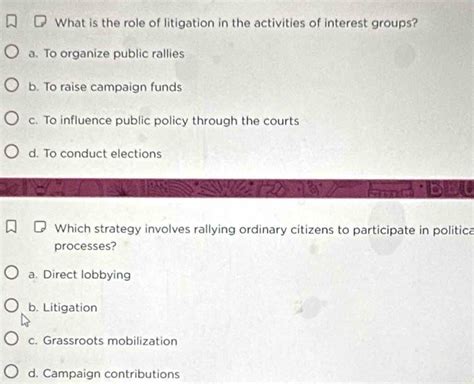Interest groups are organizations that represent the interests of a particular group of people. They use a variety of strategies to influence policy, including lobbying, public relations, and litigation.

Litigation is the process of bringing a lawsuit to court. Interest groups can use litigation to challenge government actions, to seek damages for injuries, or to obtain injunctions to stop harmful activities.
Litigation can be an effective way for interest groups to influence policy. By bringing lawsuits, interest groups can raise awareness of their issues, put pressure on government officials, and win favorable court rulings.
How Interest Groups Use Litigation
Interest groups use litigation in a variety of ways to influence policy. Some of the most common uses include:
- To challenge government actions. Interest groups can use litigation to challenge government actions that they believe are illegal or harmful to their interests. For example, environmental groups have used litigation to challenge government approvals of new oil drilling projects.
- To seek damages for injuries. Interest groups can also use litigation to seek damages for injuries caused by government actions or by private parties. For example, victims of discrimination have used litigation to seek damages from employers or government agencies.
- To obtain injunctions to stop harmful activities. Interest groups can also use litigation to obtain injunctions to stop harmful activities. For example, animal rights groups have used litigation to obtain injunctions to stop the use of animals in medical research.
The Benefits of Litigation for Interest Groups
There are a number of benefits to using litigation as a strategy of influence. Some of the most important benefits include:
- Litigation can be effective. Litigation can be an effective way to challenge government actions, to seek damages for injuries, and to obtain injunctions to stop harmful activities.
- Litigation can raise awareness of issues. Litigation can help to raise awareness of important issues and to put pressure on government officials to take action.
- Litigation can lead to favorable court rulings. Litigation can lead to favorable court rulings that can protect the interests of interest groups and their members.
The Challenges of Litigation for Interest Groups
There are also a number of challenges to using litigation as a strategy of influence. Some of the most important challenges include:
- Litigation can be expensive. Litigation can be expensive, and interest groups must carefully consider the costs and benefits of bringing a lawsuit.
- Litigation can be time-consuming. Litigation can be time-consuming, and interest groups must be prepared to commit to a long-term process.
- Litigation can be risky. Litigation can be risky, and interest groups must be prepared for the possibility of losing their case.
Conclusion
Litigation can be an effective tool for interest groups to influence policy. However, it is important to weigh the benefits and challenges of litigation carefully before deciding to bring a lawsuit.
